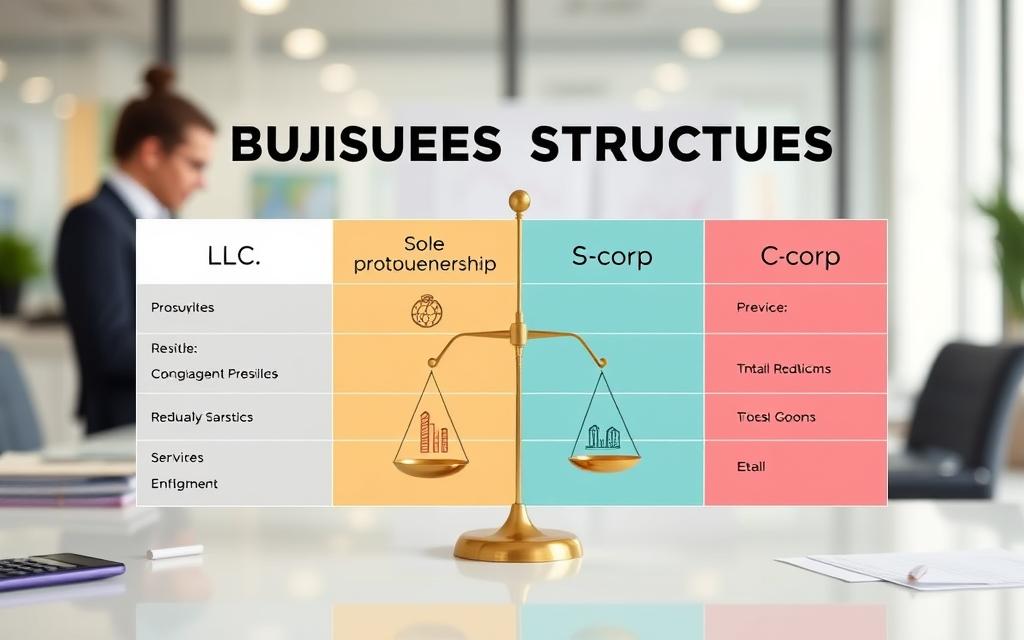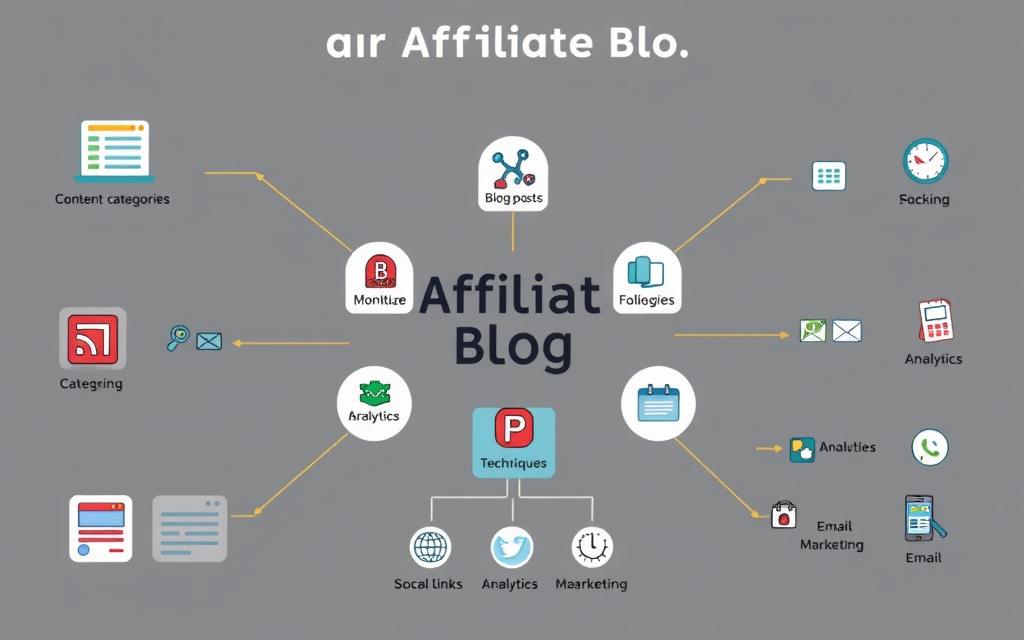Starting a business is full of big decisions. One key choice is what legal structure your business will have. Will it be a Limited Liability Company (LLC), a sole proprietorship, or a corporation? This article will help you understand these options. It aims to guide you in picking the best structure for your business goals and needs.
Before we get into the details, think about this: Is your current business structure right for your company’s future? Many entrepreneurs don’t fully understand the differences between various business types. This can lead to missing out on important benefits, tax savings, and flexibility. By looking at the pros and cons of each, you can make sure your choice helps your business grow and thrive.
Key Takeaways
- Understand the core characteristics and benefits of the LLC business structure.
- Assess the advantages and disadvantages of LLCs compared to sole proprietorships and corporations.
- Determine the factors to consider when choosing the right legal entity for your business.
- Gain insights into the process of forming and maintaining an LLC.
- Explore the tax implications and compliance requirements associated with LLCs.
What Is an LLC?
A limited liability company (LLC) is a common business structure. It offers many benefits for entrepreneurs and small business owners. An LLC combines the protection of a corporation with the flexibility and tax benefits of a partnership or sole proprietorship.
Definition and Overview
An LLC is a legal business entity created under state law. It gives its owners, known as members, limited liability protection. This means their personal assets are safe from the business’s debts and liabilities.
This limited liability company advantages is a big reason why LLC formation is popular among small business owners.
Key Characteristics
- Hybrid business structure combining elements of corporations and partnerships
- Flexible management structure, with members or managers overseeing operations
- Passthrough taxation, with profits and losses flowing through to members’ personal tax returns
- Requirement to file articles of organization in the state where the LLC is formed
- Ability to have a single member (sole proprietorship) or multiple members (partnership)
The LLC has become popular because it offers the best of both worlds. It’s a great choice for many businesses. As the limited liability company advantages and LLC formation keep growing, more entrepreneurs are choosing LLCs for their versatility and protection.
Advantages of an LLC
The Limited Liability Company (LLC) is a top choice for small businesses. It protects personal assets and offers flexible tax options. These benefits make it a great option for entrepreneurs and small business owners.
Limited Liability Protection
LLCs provide strong protection against business risks. Unlike sole proprietorships or partnerships, LLCs keep personal assets safe. This means your home and savings are usually protected if your business faces legal issues or debts.
Tax Flexibility
LLCs also offer great tax benefits. You can choose how your business is taxed. This flexibility helps you tailor your taxes to your business needs.
Operational Flexibility
LLCs are also very flexible in how they operate. You can set up your business to fit your goals. This makes it easier to run your business and adapt to changes.
Overall, LLCs are a great choice for many small businesses. They offer strong protection, tax benefits, and flexibility. If you’re thinking about starting a business, consider the LLC advantages. Talk to legal and financial experts to see if an LLC is right for you.
“The LLC structure allows us to protect our personal assets while maintaining the flexibility to adapt our business model as needed. It’s been a game-changer for our company.”
– Jane Doe, CEO of ABC Enterprises
| Key LLC Advantages | Benefits |
|---|---|
| Limited Liability Protection | Safeguards personal assets from business liabilities |
| Tax Flexibility | Allows for optimization of tax strategy |
| Operational Flexibility | Customizable management structure and profit distribution |
Disadvantages of an LLC
While LLCs offer many benefits, it’s important to look at their downsides too. Two main drawbacks are the self-employment taxes and the limited growth potential.
Self-Employment Taxes
One big disadvantage of an LLC is the self-employment taxes. LLC members must pay self-employment taxes. This includes money for Social Security and Medicare. This can lead to a higher tax bill than other business types, like corporations.
Limited Growth Potential
Another drawback of an LLC is its limited growth. LLCs can’t issue stock, which makes it hard to get outside investors. This can hold back an LLC’s ability to grow and fund long-term plans.
| Disadvantage | Impact |
|---|---|
| Self-Employment Taxes | LLC members are subject to higher tax burdens due to self-employment tax contributions. |
| Limited Growth Potential | LLCs face obstacles in raising capital and accessing public markets, which can restrict their ability to expand and scale. |
Entrepreneurs thinking about starting an LLC should think about these downsides. They should decide if an LLC is right for their business needs and goals.
LLC vs. Sole Proprietorship
When you look at LLCs and sole proprietorships, the main difference is in liability protection. An LLC acts as a separate entity, protecting its owners from personal liability. On the other hand, a sole proprietorship doesn’t offer this protection, leaving personal assets at risk.
Liability Differences
In an LLC, the owners’ personal assets are safe from the company’s debts. This means their homes or savings are usually protected from creditors. Sole proprietors, however, face personal liability for all business debts and legal issues, risking their personal wealth.
Taxation Considerations
- LLCs can be taxed in various ways, including as a partnership, corporation, or sole proprietorship for single-member LLCs.
- Sole proprietors report their business income and expenses on their personal tax returns. They also face self-employment taxes.
Ease of Formation
Starting a sole proprietorship is simpler and cheaper than setting up an LLC. Sole proprietors can start their business without much paperwork, unlike LLCs which need more formalities and fees.
The choice between an LLC and a sole proprietorship depends on your business entity comparison and needs. Entrepreneurs should weigh the pros and cons of liability protection, taxation, and formation ease when picking the right small business legal structures.
LLC vs. Corporation
Choosing the right business structure is crucial. You might be deciding between an LLC and a corporation. Both have their own benefits. It’s important to know the differences in ownership, rules, and how profits are shared.
Ownership Structure
LLCs are flexible in who can own them. You can have one or many owners. Corporations, however, have a strict structure. They have shareholders, directors, and officers.
This difference affects how the business is run and who makes decisions.
Regulatory Requirements
Corporations have to follow stricter rules than LLCs. They need to hold meetings and file reports. LLCs have fewer rules, making them easier for small businesses.
Distribution of Profits
How profits are shared is different for LLCs and corporations. LLCs pass profits directly to owners, avoiding double taxation. Corporations, however, are taxed twice: once as a company and again when profits are given to shareholders.
| Feature | LLC | Corporation |
|---|---|---|
| Ownership Structure | Flexible, single or multiple members | Formal hierarchy, with shareholders, directors, and officers |
| Regulatory Requirements | Less formal, fewer compliance obligations | More stringent governance structure, reporting, and filings |
| Profit Distribution | Pass-through taxation, profits reported on personal tax returns | Subject to double taxation, profits taxed at both corporate and individual levels |
When deciding between a corporation and an LLC, think about your business needs. Consider your growth plans and the local laws. Getting advice from a professional can help you choose the best option for your business.
How to Form an LLC
Starting a Limited Liability Company (LLC) is easy once you know the steps. This guide will help you set up your LLC, whether it’s new or an existing business. We’ll cover the key steps to get your LLC up and running.
Choosing a State
The first thing to do is pick a state for your LLC. Think about tax rates, filing fees, and the state’s business climate. Many choose their home state, but some prefer Delaware or Nevada for better laws.
Filing Articles of Organization
After picking a state, file the Articles of Organization with the state agency. This document has your LLC’s basic info, like name and purpose. Fees and filing processes differ by state, so check the specific rules.
Creating an Operating Agreement
An Operating Agreement is key, even if not mandatory. It outlines how your LLC works, including member roles and profit sharing. A good agreement helps avoid conflicts and keeps your business running smoothly.
Forming an LLC takes a few steps, but with the right help, it’s manageable. Make sure to follow your state’s LLC filing requirements to keep your business safe and compliant.

LLC Maintenance Requirements
Keeping an LLC running smoothly is more than just starting it. You need to follow ongoing rules to keep your business legal. This includes filing annual reports and keeping detailed records.
Annual Reports and Fees
Most states ask LLCs to file annual reports. These reports update your LLC’s details like who owns it and how it’s doing. You also have to pay a fee, which can be between $10 and $500.
It’s important to file these reports on time. This keeps your LLC in good shape and avoids fines or even closing your business.
Record Keeping
- As an LLC owner, you must keep detailed records of your company’s finances and decisions.
- This means accurate accounts, tracking money, and recording big decisions.
- Good records help with taxes and show your LLC is real if questioned by authorities.
Following LLC rules and keeping records well is key to your business’s success and staying legal.
| State | Annual Report Due | Filing Fee |
|---|---|---|
| California | Anniversary of Formation | $20 |
| New York | June 1st | $9 |
| Texas | May 15th | $75 |
| Florida | Anniversary of Formation | $138.75 |
Tax Implications for LLCs
LLCs have a big advantage when it comes to taxes. They don’t pay corporate income tax. Instead, profits and losses are passed on to the members. These members then report them on their personal tax returns.
Pass-Through Taxation
LLCs’ pass-through taxation has many benefits. It makes tax filing easier because members only report their share on their personal returns. This can save a lot of money, especially for small businesses or startups.
State Tax Variations
- Even though the federal tax rules for LLCs are the same, states can have different rules. Some states charge extra taxes or fees, like annual franchise taxes or gross receipts taxes.
- It’s very important for LLC owners to check the tax rules in their state. These rules can greatly affect the business’s taxes and profits.
Knowing about the tax rules for LLCs is key when picking a business structure. By looking at the benefits of pass-through taxation and state taxes, entrepreneurs can make a smart choice. This choice should match their business goals and financial plans.
“The tax implications of an LLC can have a significant impact on the overall profitability and viability of a business. Careful consideration of these factors is essential when choosing the appropriate legal structure.”
When to Choose an LLC
The Limited Liability Company (LLC) is a great choice for many startups and small businesses. It offers protection and flexibility. Knowing when to choose an LLC helps entrepreneurs pick the best structure for their business.
Ideal Business Scenarios
LLCs are perfect for certain types of businesses. They are ideal for:
- Small to medium-sized companies wanting to protect their personal assets
- Businesses with multiple owners who want to share profits and responsibilities
- Service-based companies, like consulting, law, or medical practices
- Startups and small businesses in tech, e-commerce, or creative services
Future Growth Potential
LLCs are great for businesses looking to grow. They offer several benefits for expansion:
- Easy to add or change members without big changes
- Ability to raise capital through member contributions or outside investment
- Scalable operations and the chance to open more locations
- Simplified tax reporting as the business grows, with options to change tax status
By thinking about the ideal scenarios and growth potential, entrepreneurs can decide if an LLC is right for their business. This choice supports both short- and long-term goals.
“The LLC structure provides the perfect balance of liability protection and operational flexibility for many businesses, especially those with growth ambitions.”
Common Misconceptions About LLCs
There are many myths about limited liability companies (LLCs) that can confuse people. Let’s clear up some common misconceptions. This will help you understand the LLC better compared to other business types.
Liability Myths
Many think LLCs offer complete protection from lawsuits. But, this isn’t always true. The protection can be broken if the LLC is used for fraud or if it doesn’t follow business rules.
- Myth: LLCs provide complete liability protection for the owners.
- Fact: LLCs offer limited liability protection, but this can be compromised if the business is not operated properly.
Cost Misunderstandings
Some believe LLCs are too expensive to start and keep running. But, the costs really depend on the state and the business’s needs.
- Myth: LLCs are more expensive to form and maintain compared to other business structures.
- Fact: The costs of forming and maintaining an LLC can be reasonable and may even be lower than some other options, depending on the state and the complexity of the business.
By understanding and debunking these myths, you can make a better choice. This choice will be based on the limited liability company advantages for your business.
Conclusion: Choosing the Right Structure
When looking at different business structures, it’s key to think about what you need now and what you might need later. You should pick an LLC, sole proprietorship, or corporation based on what each offers. Know the good and bad of each choice.
Evaluating Your Business Needs
Think about what’s important for your business. This includes how much protection you need, your tax situation, how flexible you can be, and how big you want to grow. Look at your industry, who you’re selling to, and how much money you expect to make. This will help you choose the best structure for your business.
Consulting with Professionals
Choosing the right business structure can be tricky. It’s a good idea to talk to lawyers and accountants. They can help you understand the differences between an LLC compared to other business entity comparison options. This way, you can make a choice that will help your business succeed in the long run.












Leave a Reply